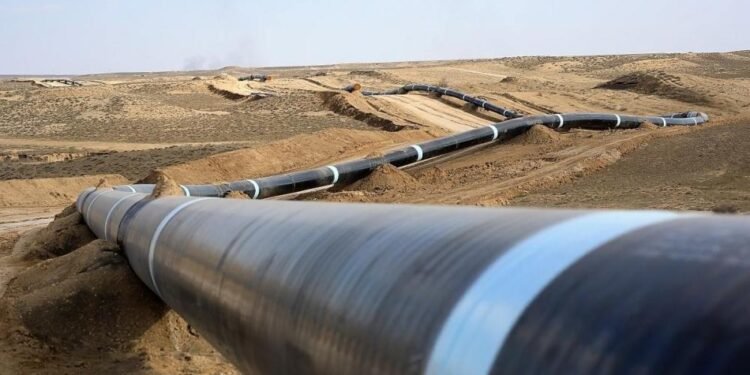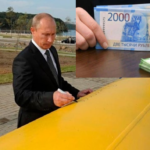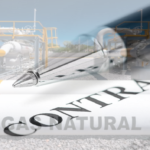EU countries are beginning to adopt policies and positions that best serves their national interests, as it relates to how to handle Russian gas in the wake of Kremlin’s invasion of Ukraine and the sanctions response that followed it.
Developments in two eastern European countries now in the European Union, but previously behind the “iron curtain” portrays this trend. While Lithuania (formerly part of the Soviet Union) announce that it has stopped buying Russian gas, Slovakia (formerly part of Czechoslovakia) indicated that it was willing to pay for Russian gas in rubles.
Also read: Ukraine wants to be given sanctioned Russian money for reconstruction
On 2nd April, the Ministry of Energy of the Republic of Lithuania issued a statement titled “Lithuania completely abandons Russian gas imports.”
“Seeking full energy independence from Russian gas, in response to Russia’s energy blackmail in Europe and the war in Ukraine, Lithuania has completely abandoned Russian gas: Lithuania’s gas transmission system has been operating without Russian gas imports since the beginning of this month.
“In these circumstances, Russia’s demand to pay for gas in rubles is meaningless, as Lithuania no longer orders Russian gas and no longer plans to pay for it,” the Lithuanian Energy Ministry said in the statement.
The Ministry went further to state that the halt in purchase of Russian gas was confirmed by the data of the Lithuanian gas transmission system operator Amber Grid, which shows that on 2 April the import of Russian gas for Lithuania’s needs through the Lithuanian-Belarusian interconnection was equal to 0 MWh.
All Lithuanian gas demand is satisfied through klaipeda liquefied natural gas (LNG) terminal. The official schedules planned by the liquefied natural gas terminal operator Klaipedos Nafta indicate that three large cargoes of liquefied natural gas will reach the terminal each month, which are planned to be enough for all customers. For the next period, customers have placed orders for gas transportation only from the terminal. If necessary, gas can also be delivered to Lithuania via the gas link with Latvia, and from 1 May – through the gas link with Poland.
Minister of Energy Dainius Kreivys says that this is a turning point in the history of Lithuania’s energy independence: “We are the first EU country among Gazprom’s supply countries to gain independence from Russian gas supplies, and this is the result of a multi-year coherent energy policy and timely infrastructure decisions”.
Slovakia on the other hand is taking a position that it believes will protect its national interests, and therefore would do whatever is necessary in her interest as regards to Russian gas. Hungary, another eastern European country and a member of the EU has taken similar positions in the week.
Slovak Economy Minister Richard Sulik said on Saturday that the country cannot afford to lose its major gas supplier. Speaking on national television, the Minister said;
“If there is a condition to pay in rubles, then we will pay in rubles,” Sulik said. He stressed that Russian imports account for roughly 85% of all Slovakian gas supplies, so the country’s authorities will remain pragmatic on the issue.
“We cannot be cut off from gas,” Sulik emphasized, urging the rest of Europe to jointly seek a solution.
Nearly all of the countries of the European Union, of which Slovakia is a member, slapped Russia with economic sanctions over the past month, jeopardizing Russia’s ability to receive payments from trade partners in the European currency. In response, Russian President Vladimir Putin last week signed a decree introducing a new ruble gas payment mechanism.
Dmitry Peskov, press secretary to President Vladimir Putin has tagged the new payment mechanism a “prototype system” of payment in rubles that may soon extend to other Russian exports.
“Everything will be fast, clear, understandable… These are new rules, they need to be followed. Although, I repeat once again, de facto nothing will change for European companies… They will pay, as they used to, in euros, the same currency that is indicated in the contracts. But at the same time, the final payment will go to the seller – Gazprom – in rubles,” Peskov explained.
To break it down, Russia’s new gas payment mechanism demands that buyers from ‘unfriendly’ countries that have placed sanctions on Moscow open ruble accounts in an authorized Russian bank, Gazprombank. Buyers will then transfer gas payments to the bank, which it would sell on the exchange for rubles, credit to the buyers’ ruble account, and transfer the funds to the gas provider.
He noted that European companies will have no trouble in opening ruble accounts, he said that Moscow is “relying on the common sense of those who purchase our gas,” as Russia would not be able to supply the commodity if the new payment mechanism is not respected.
Nnamdi Maduakor is a Writer, Investor and Entrepreneur























































